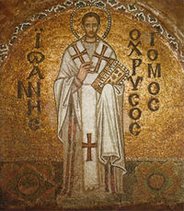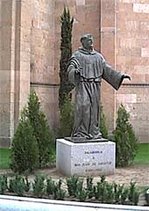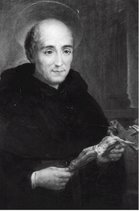Dryden en español I

John Dryden (August 19 [O.S. August 9] 1631–May 12 [O.S. May 1] 1700) was an influential English poet, literary critic, translator and playwright, who dominated the literary life of Restoration England to such a point that the period came to be known in literary circles as the Age of Dryden.
Dryden was the dominant literary figure and influence of his age.[citation needed] He established the heroic couplet as the standard meter of English poetry, by writing successful satires, religious pieces, fables, epigrams, compliments, prologues, and plays in it; he also introduced the alexandrine and triplet into the form. In his poems, translations, and criticism, he established a poetic diction appropriate to the heroic couplet—Auden referred to him as "the master of the middle style"[7]—that was a model for his contemporaries and for much of the 18th century. The considerable loss felt by the English literary community at his death was evident from the elegies which it inspired.[8] Dryden's heroic couplet became the dominant poetic form of the 18th century. The most influential poet of the 18th century, Alexander Pope, was heavily influenced by Dryden, and often borrowed from him; other writers were equally influenced by Dryden and Pope. Pope famously praised Dryden's versification in his imitation of Horace's Epistle II.i: "Dryden taught to join / The varying pause, the full resounding line, / The long majestic march, and energy divine." Samuel Johnson[9] summed up the general attitude with his remark that "the veneration with which his name is pronounced by every cultivator of English literature, is paid to him as he refined the language, improved the sentiments, and tuned the numbers of English poetry." His poems were very widely read, and are often quoted, for instance, in Tom Jones and Johnson's essays.
(From Wikipedia)
Canción del italiano de <
Yaciendo bajo melancólico ciprés
Lloraba Damián, todo pálido y moribundo
-Amable es la muerta que acaba con mi penar
Pero cruel aquella que en vano amé
Las fuentes musgosas mis cuitas murmuran
Montes huecos hacen ecos de mis gruñidos
Toda ninfa me llora
Mientras agonizo
Ella sólo me desdeña
Que dio causa a mi dolor
El amor no correspondido
y negado toda esperanza-
Yaciendo bajo melancólico ciprés
Cual cisne cantaba al agonizar
-Amable es la muerte que acaba mi penar
Pero cruel aquella que en vano amé.-
A song from the Italian from Limberham: or, the Kind Keeper
by John Dryden
By a dismal cypress lying,
Damon cried, all pale and dying,
Kind is death that ends my pain,
But cruel she I lov'd in vain.
The mossy fountains
Murmur my trouble,
And hollow mountains
My groans redouble:
Ev'ry nymph mourns me,
Thus while I languish;
She only scorns me,
Who caus'd my anguish.
No love returning me, but all hope denying;
By a dismal cypress lying,
Like a swan, so sung he dying:
Kind is death that ends my pain,
But cruel she I lov'd in vain.





















No comments:
Post a Comment